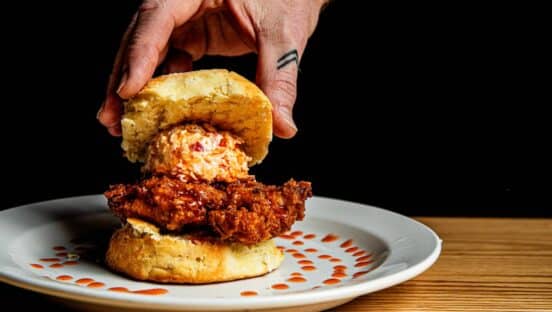Five to Seven, a new restaurant funding initiative launched in May by foodservice industry veterans Brad Blum and John Vincent, has goodness at its core and as its goal. “Good food for the planet” is the initiative’s tagline, as Blum and Vincent want “good food”—good in flavor, nutrition, and sustainability—to be an easily attainable commodity all over the world.
“[John and I] feel so strongly about this non-negotiable, good-for-the-planet part of our vision,” says Blum, whose extensive resume includes a stint as Burger King’s CEO. “We’ve both created brands that support that vision, and we want to raise capital to support other businesses—emerging [brands] or perhaps large, established brands—that are moving toward this approach.”
Five to Seven–supported brands will offer food that follows five specific principles: Exceptionally Good Tasting; Remarkably Good for You; Leaves You Feeling Good; Good Everyday Value; and Good to the Planet.
The initiative’s goal is to raise $50 million in the next five years to create and invest in good-for-the-planet brands. Each business will be expected to have the five standards at its core and be focused on a sustainable profit model.
“We’ve talked over the years about making the best food for the most people. Or, what if God did fast food?” says Vincent, founder of British quick-serve chain Leon. “[The five principles] cover the things that, fundamentally, good food has always been about.”
Vincent says high-quality, sustainably raised ingredients and well-balanced recipes are essential to food that’s good for people and good for the community. But he and Blum are looking for more than just a well-crafted menu. Leadership is another crucial element for Five to Seven brands.
“We’re in the kitchens. We’re with the chef. We’re hands-on and want to find people who do the same thing to make food that really tastes great,” Blum says. “We share a strong belief that you can have really good-tasting food that’s really good for you.”
When creating and investing in brands that adhere to Five to Seven’s five principles, Blum and Vincent say, they intend to keep the focus on broad, positive progress rather than over-magnified measurement.
“The problem is as soon as you say, ‘We’re ethical,’ you spend all your life trying to measure the last bit of detail, and you actually never do any good work,” Vincent says. “We don’t want to get bogged down in the measure of what we mean by these things, though we do want to come up with our own assessment of it. If we’re lucky, there will be an external measure.”
To some degree, there already is. Leon, for example, is a founding member of the United Kingdom–based Sustainable Restaurant Association, which rates restaurants based on a rigorous set of sustainability guidelines. The Association’s ratings mostly cover restaurants in the U.K., but Vincent hopes it will expand in the future.
With hundreds of battling diet trends, as well as individual dietary needs, creating food that is “good for you” might be too broad to define, says Joan Salge Blake, author and clinical associate professor at Boston University's Sargent College of Health and Rehabilitation Sciences. She says education, rather than trendy, healthful-sounding foods, is crucial to battling the problem of obesity.
“What I’d like to see [Five to Seven] do is produce foods that are as close to mother nature as possible and help educate the consumer,” Salge Blake says. “I’d like to see a takeout plate that’s in the realm of calorie distribution that’s appropriate, and the public really needs to understand what they’re eating. People often see a cookie made with honey and think, ‘Oh, it’s healthy. I can have several.’ You have to be careful.”
Vincent says Five to Seven will approach its “good-for-you food” definition similarly to another well-known voice in healthy eating.
“We’re big on the Michael Pollan approach: ‘Eat food. Not too much. Mostly plants,’” he says. “We believe good foods are based on lots of good fats, vegetables, and lean meats like chicken and turkey.”
This is not to say that Five to Seven’s restaurant will eschew other forms of protein. Another component to their health-food philosophy is balance.
“We want to ensure that our meat is as high quality as can be,” Blum says. “Better for people, no hormones, no antibiotics, no nitrates. Also, there’s the need for balance and the idea of moderation.”
Blum and Vincent hope to spread the five good-food principles across all seven continents (thus, Five to Seven), and the plan is already underway, funded in part by Vincent’s and Blum’s personal holdings. The business partners are also expanding their own brands—Leon, New York–based Dogmatic, and U.K.–based Flatplanet—as they create new Five to Seven partnerships that will be announced in the next six months.






